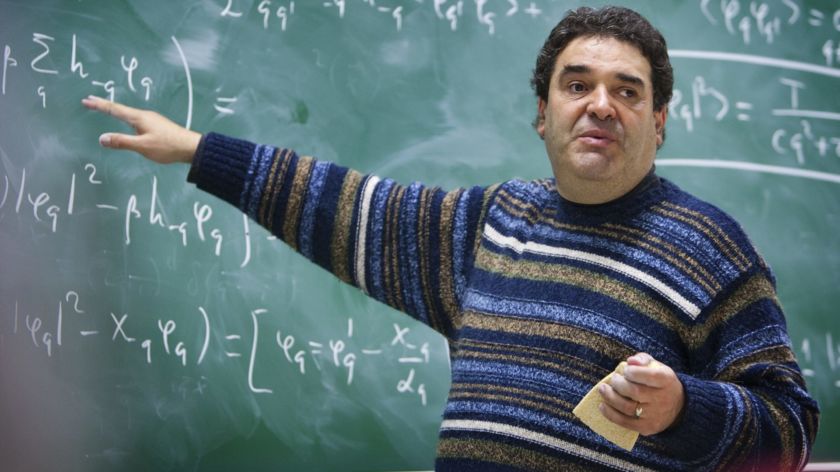Shocked professor Mikhail Katsnelson stays in contact with Russian colleagues
-
 Mikhail Katsnelson. Foto: Dick van Aalst
Mikhail Katsnelson. Foto: Dick van Aalst
His Russian background feels ‘very uncomfortable’, says Mikhail Katsnelson. The professor in theoretical solid-state physics is troubled by the Russian invasion in Ukraine. Still, he wonders whether boycotting Russian universities will have any effect.
Mikhail Katsnelson emphasises how hard it is for institutions and individual researchers in Russia to speak out against the regime. ‘Sometimes you read a declaration of support of a Russian university to the government. You have to ask yourself how voluntary it is. Often, the highest achievable result is being able to keep quiet about politics.’
‘People are scared. And with good reason. If I talk to colleagues in Russia right now, I keep it confined to science. I do not want to endanger them by talking about politics. I grew up during the reign of Breznjev, you don’t have to explain to me what they feel like right now.’
Ongoing research
Katsnelson is not going to terminate the ongoing research he is conducting with Russian colleagues. This is in line with the Executive Board’s advice to maintain personal relationships with Russian scientists. However, Dutch universities have frozen all their formal collaborations with Russian and Belarusian institutes.
‘Is the war going to stop if scientific articles are not published?’
The Russian-Jewish Spinoza Prize winner has mixed feelings about this. ‘You can ask yourself whether you still want to collaborate with people who openly and voluntarily support Putin. I don’t really know what this boycott is going to achieve. Is the war going to stop if a few scientific articles are not published?’
‘It goes against scientific ethics to suddenly stop ongoing research because of the political situation. Also, you can’t just go ahead and remove colleagues as authors,’ says Katsnelson.
Russian science
Russian science will survive this ‘boycott’, Katsnelson thinks. ‘Lev Landau published his theory of phase transitions during Stalin’s regime. Heisenberg and Von Weizsäcker continued to do science during the Nazi regime. Even during the most terrible times, parts of science survive.’
‘We should avoid the idea of a collective Russian guilt’
Katsnelson, who is glad that his own children now live outside of Russia, does not expect scientists to flee Russia en masse. ‘It is often practically impossible. You have to have a visa, you have to be able to cross the border somewhere and you have to have no family ties keeping you tied to the country. Many scientists will be extremely unhappy, but will stay in the country.’
Uncomfortable
Above all, the Academy Professor hopes that a Third World War will be averted, but says he feels extremely powerless in this respect. Within his academic circle, he does not notice any anti-Russian sentiment. ‘My Russian background has felt very uncomfortable since the annexation of Crimea in 2014. But we should avoid the idea of a collective Russian guilt. Everyone takes their own position.’
Katsnelson says he is currently working on autopilot. He checks articles, he conducts research, but everything that requires creativity is at a standstill. There is no room in his head for new ideas. Nor for his poetry. ‘I’m too shocked.’




Todd B. schreef op 17 maart 2022 om 12:26
Quite an important typo in his second quote: “I do want to endanger them by talking about politics.”
Mathijs Noij schreef op 17 maart 2022 om 13:37
Thank you!